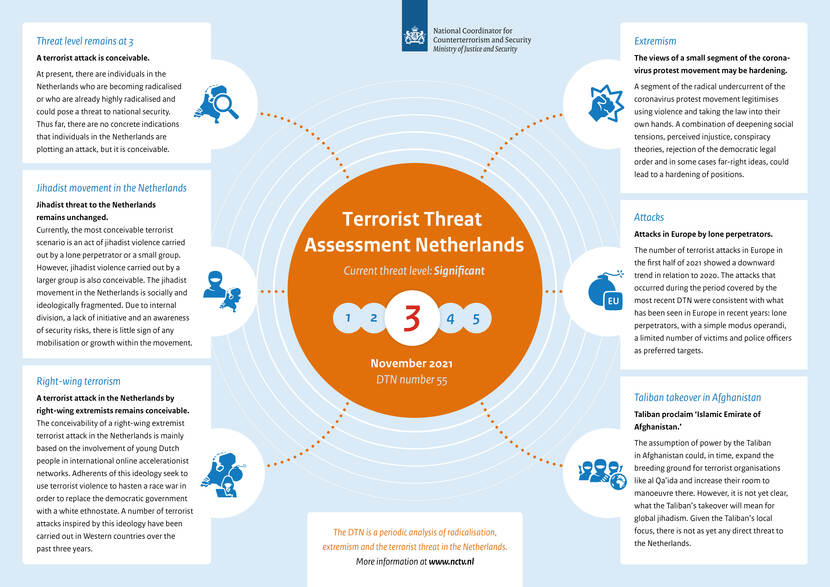NCTV Terrorist Threat Assessment: no specific indications point to an attack, but the threat remains conceivable
At present, there are individuals in the Netherlands who are becoming radicalised or who are already highly radicalised and could pose a threat to national security. The jihadist movement in the Netherlands remains a key element of this threat. This is demonstrated by various court cases and arrests, such as those in Eindhoven on 23 September, that took place during the period covered by the current threat assessment. Currently, there are no concrete indications that individuals in the Netherlands are preparing an attack, though it is conceivable. It is also conceivable that an attack could be carried out by right-wing extremists. Yet the current threat, whether jihadist or right-wing extremist in nature, has not led to a higher threat assessment. For this reason the threat level has been maintained at 3 (on a scale of 1 to 5). These are some of the key conclusions of the 55th edition of the Terrorist Threat Assessment for the Netherlands, published by the National Coordinator for Counterterrorism and Security (NCTV).
Right-wing terrorism
The conceivability of a right-wing extremist terrorist attack in the Netherlands is mainly tied to the involvement of young Dutch men in international online accelerationist networks. Accelerationism is a right-wing extremist ideology that is being spread via various (mostly non-public) social media platforms. Its adherents glorify and justify terrorist violence for the purpose of hastening the outbreak of a race war. Their aim in this regard is to create chaos in society so that the current political system can be replaced by a white (national socialist) ethnostate. A number of terrorist attacks inspired by this ideology have been carried out in Western countries over the past three years. In the Netherlands there are at least a few hundred Dutch people between the ages of 12 and 20 who spend much of their time online as part of fluid international networks composed of several thousand people around the world. These young Dutch people often seem to struggle with psychosocial problems and a weak social safety net.
Fragmentation and intermingling at coronavirus protests
During the period under review there have been two general developments with regard to coronavirus-related protests. On the one hand, with the relaxation of coronavirus measures in June, the number of demonstrations against these measures has declined. But on the other hand, there is a risk that a segment of the movement’s uncompromising undercurrent is becoming more radicalised. The social threshold for discussing and committing unlawful acts has become lower, and violent incidents continue to occur, such as the plotting of an attack on a vaccination centre in Den Helder using a firework bomb. Now that the coronavirus protests are dying down, a segment of this harder undercurrent remains.
The Dutch jihadist movement
The jihadist threat to the Netherlands remains unchanged and continues to constitute the main terrorist threat to the country. At present, the most conceivable terrorist scenario for the Netherlands is an act of jihadist violence carried out by a lone perpetrator or a small group. The jihadist movement is fragmented, both socially and ideologically. Due to internal division, a lack of initiative and an awareness of security risks, there is little sign of any mobilisation or growth within the movement. However, this does not mean that the threat posed by the movement has disappeared.
There are still dozens of people, both suspected and convicted jihadists, being held in the three dedicated terrorist wings of Dutch prisons, including a number of men who took part in the fighting in Syria and Iraq. It is anticipated that these former fighters will be released next year. It can be assumed that even after serving out their sentences, the majority of them will not have renounced the violent ideology of ISIS; moreover, this is a group of people who have experience with firearms, explosives and extreme forms of violence. However, it is too early to say whether they will return to their old jihadist networks after their release or whether they will still be prepared to carry out attacks.
Global jihadism
On a global scale there are developments ongoing in the jihadist movement that are relevant to the terrorist threat to the Netherlands. Over the past few years ISIS has transformed from an organisation focused primarily on the armed conflict in Iraq and Syria, into one that is increasingly focused on waging global jihad. Sub-Saharan Africa has grown in importance to ISIS’s global ambition. A further consolidation of the position of groups loyal to ISIS and al Qa’ida in Sub-Saharan Africa can lead to the establishment of jihadist safe havens there. The Taliban's assumption of power in Afghanistan could, in time, expand the breeding ground for terrorist organisations like al Qa’ida and increase their room to manoeuvre there. Given the Taliban's local focus, there is not as yet any direct threat to the Netherlands.
